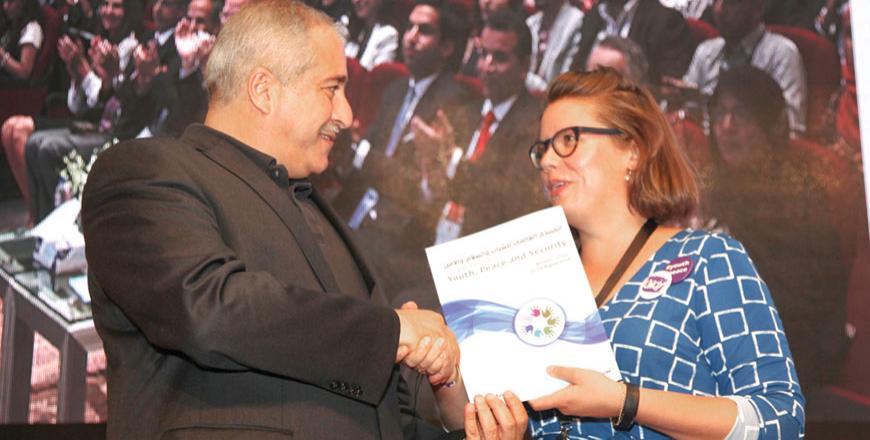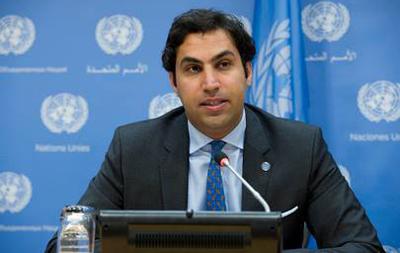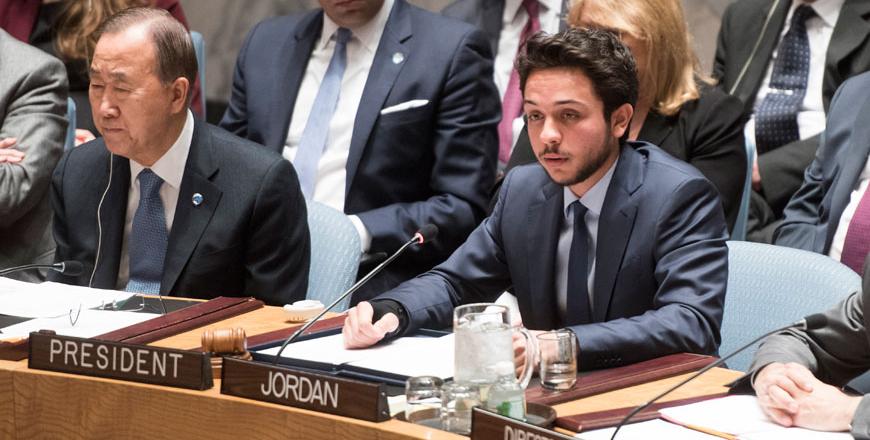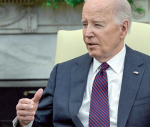You are here
Amman Youth Declaration announced, awaiting international endorsement
By Dana Al Emam - Aug 22,2015 - Last updated at Aug 22,2015

Deputy Prime Minister and Foreign Minister Nasser Judeh receives the Amman Youth Declaration’s final draft from a participant at the conclusion of the Global Forum on Youth, Peace and Security in Madaba on Saturday (Photo by Osama Aqarbeh)
MADABA — Youth ambassadors and peace builders from all over the world convening in Jordan adopted the Amman Youth Declaration on Youth, Peace and Security on Saturday.
In an Instagram post Saturday, the Crown Prince wrote: “Thank you to all who contributed to the success of this Forum. The adoption of ‘The Amman Youth Declaration’ represents a historic milestone for engaging youth in peace and security #Youth4Peace #OurJordan”
The declaration, announced at the Global Forum on Youth, Peace and Security, seeks to enhance the young people’s participation and leadership in issues of peace and security and enhance their involvement in violence prevention and peace building.
It also addresses gender equality and the socio-economic empowerment of youth, who form the majority of the world's population.
UN Secretary General's Envoy on Youth Ahmad Alhendawi said Jordan is to take the declaration back to the UN Security Council, which will direct it and shape it in a resolution that focuses on youth, peace and security.
"Youth delegations have the responsibility to carry the Amman Youth Declaration and expand the network of peace builders around the world," he told The Jordan Times, adding that the implementation of the declaration must engage institutions and organisations to highlight the interconnectedness between peace and development.
The uniqueness of the declaration, according to Alhendawi, is the commitment of the UN to the the declaration and the fact that it is entirely written by the young people, adding that some 11,000 young people over the world had contributed to online consultations of the document.
“The declaration is a call for the international community, and we have to make sure this call will not be a missed call,” he told The Jordan Times, highlighting the UN’s keenness on highlighting the potential of young people and their ability to influence the reality of the world by adopting the declaration.
Some 500 participants from all continents took part in the forum’s discussions, both at the regional and international levels, reiterating the similarities of the challenges facing them, despite the difference in country codes.
Coming from Lebanon, Bassma Abdul Khalek said her country has passed regulations that theoretically seek to enhance the engagement of youth in public life, but they are not implemented on ground, an issue that undermines young people’s trust in the government.
If present, youth-related policies are usually “inefficient”, she told The Jordan Times, adding that the rise of extremism is another major issue facing the future of her peers.
But for Hicotaka Koike from Japan, one of the major challenges facing the young people in his country is the ability to express their individual views on local issues, as well as the lack of laws penalising hate speech, two matters that youth must be more involved in shaping.
Meanwhile, the forum was a “great” chance for Lalaina Randriarimanana from Madagascar to network with people from Europe and Asia, an experience she has never had before.
“The shared challenges facing all young people across the globe tell each one of us that they are not alone,” she told The Jordan Times, adding that she learned some of the emerging trends of research on peace and youth.
‘Youth in Jordan: A case study’
Jordan’s societal security and ability to stand firm against regional challenges stems from the peaceful relations binding Jordanians from all walks to life, said panellists, renewing Jordan’s call for peace to prevail worldwide.
Mostafa Abu Sway, professor of philosophy and Islamic Studies at the Jerusalem-based Al Quds University, said Jordan has translated the Islamic teachings of peace into policies and initiatives, including the Amman Message, to encourage inter-Islamic dialogue as well as that with non-Muslims.
He cited Jordan’s deeds in hosing refugees and helping people in need, adding that “Jordan has a big heart, despite the lack of resources.”
For his side, Father Nabil Haddad, director of the Jordanian Interfaith, Coexistence Research Centre, said Muslims and Christians in this part of the world have been living peacefully and accepting each other for 1,400 years and will remain so forever.
“Jordan needs to transfer its experience in peace through international peace ambassadors for other countries to learn,” he said.
Commenting on the empowerment of young Jordanians, Saeb Al Hassan from the King Abdullah II Fund for Development, said the fund seeks to enhance civic culture among the young generation through capacity-building training, noting that the fund has provided over 2 million training opportunities for youth since 2002.
Nonetheless, Jordan must enhance job opportunities for women, who form up to 75 per cent of unemployed Jordanians, as well as improving the chances for diploma holders and supporting those in vocational training, according to Omar Masarweh from the Queen Rania Foundation.
Related Articles
AMMAN — The Global Forum on Youth, Peace and Security, to be hosted by Jordan on Friday and Saturday, is "the most important international p
UNITED NATIONS — Every time youth issues come to the UN Security Council, they come as a problem — foreign fighters, victims or perpetrators
AMMAN — The United Nations Security Council (UNSC) adopted on Wednesday an “historic” resolution on youth, peace and security, which, for th


















